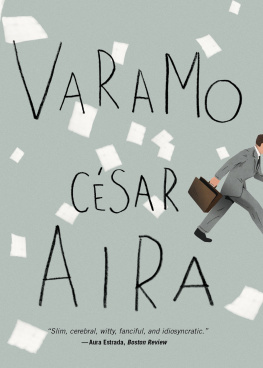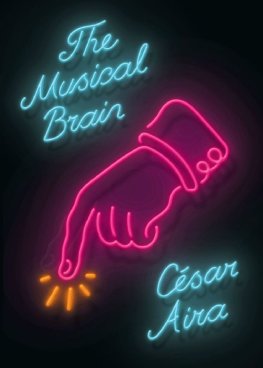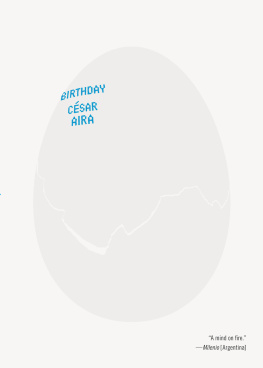Aira - Varamo
Here you can read online Aira - Varamo full text of the book (entire story) in english for free. Download pdf and epub, get meaning, cover and reviews about this ebook. City: New York, year: 2012, publisher: New Directions Publishing, genre: Detective and thriller. Description of the work, (preface) as well as reviews are available. Best literature library LitArk.com created for fans of good reading and offers a wide selection of genres:
Romance novel
Science fiction
Adventure
Detective
Science
History
Home and family
Prose
Art
Politics
Computer
Non-fiction
Religion
Business
Children
Humor
Choose a favorite category and find really read worthwhile books. Enjoy immersion in the world of imagination, feel the emotions of the characters or learn something new for yourself, make an fascinating discovery.
- Book:Varamo
- Author:
- Publisher:New Directions Publishing
- Genre:
- Year:2012
- City:New York
- Rating:5 / 5
- Favourites:Add to favourites
- Your mark:
- 100
- 1
- 2
- 3
- 4
- 5
Varamo: summary, description and annotation
We offer to read an annotation, description, summary or preface (depends on what the author of the book "Varamo" wrote himself). If you haven't found the necessary information about the book — write in the comments, we will try to find it.
Varamo — read online for free the complete book (whole text) full work
Below is the text of the book, divided by pages. System saving the place of the last page read, allows you to conveniently read the book "Varamo" online for free, without having to search again every time where you left off. Put a bookmark, and you can go to the page where you finished reading at any time.
Font size:
Interval:
Bookmark:
Also by Csar Aira from NewDirections
An Episode in the Life ofa Landscape Painter
Ghosts
How I Became a Nun
Th e Literary Conference
Th e Seamstress and the Wind
Varamo
Csar Aira
Translated by ChrisAndrews
A New Directions Paperbook Original
Copyright 2002 by Csar Aira
Translation copyright 2012 by Chris Andrews
Originally published by Editorial Anagrama, S. A., 2002;published in conjunction with the literary Agency Michael Gaeb/Berlin
All rights reserved. Except for brief passages quoted in anewspaper, magazine, radio, television, or website review, no part of this bookmay be reproduced in any form or by any means, electronic or mechanical,including photocopying and recording, or by any information storage andretrieval system, without permission in writing from the Publisher.
First published as a New Directions Paperbook Original ( nd p1219 ) in 2012
Published simultaneously in Canada by Penguin Books CanadaLimited
Design by Erik Rieselbach
Library of Congress Cataloging-in-Publication Data
Aira, Csar, 1949
[Varamo. English]
Varamo / Csar Aira ; translated from the Spanish by ChrisAndrews. 1st American
paperback ed.
p. cm.
A New Directions Paperbook Original.
ISBN 978-0-8112-1741-5 (pbk. : acid-free paper)
1. PoetryAuthorshipFiction. 2. PoetsFiction. I. Andrews,Chris. II. Title.
PQ7798.1.I7V3713 2012
863'.64dc23
2011039758
10 9 8 7 6 5 4 3 2 1
New Directions Books are published for James Laughlin
by New Directions Publishing Corporation
80 Eighth Avenue, New York, NY 10011
ONE DAY IN 1923, in the city of Coln (Panama),a third-class clerk, having finished work, and, since it was payday, passed bythe cashiers desk to collect his monthly salary, left the Ministry in which hewas employed. In the interval between that moment and the dawn of the followingday, ten or twelve hours later, he completed the composition of a long poem,from the initial decision to write it up to the final period, after which therewere no further additions or corrections. Th eself-contained nature of the interval emerges more clearly still if we take intoaccount the fact that never, in all his fifty years, had he written or felt anyinclination to write a single line of poetry, and nor would he ever again. Itwas a bubble in time, in his biography, an exception without precedent orsequel. Th e action contained the inspiration,and vice versa, each nourishing and consuming the other, so that nothing wasleft over. Even so, this episode would have remained private and secret had itsprotagonist not been Varamo, had it not produced that celebrated masterpiece ofmodern Central American poetry, Th e Song of the VirginChild .
Th is enigmatic poem(published in book form just a few days later, thus consolidating its status asa legendary bolt from the blue), origin and apogee of the most daring andexperimental avant-garde movement in the language, has been repeatedly describedas an inexplicable miracle because of the insurmountable contextual problems itposes for critics and literary historians.
But there is an explanation for everything in the world.To find the explanation in this case, we must remember that just as the episodehad an end (the poem itself), so it had a beginning, and the two pointscorrespond symmetrically, as an effect corresponds to its cause, or vice versa. Th e cause, as suggested already, intervenedwhen Varamo, having finished his days work, went to the cashiers desk tocollect his salary. And what made this a beginning, the beginning of somethingthat had, as yet, no form or name, was that on this occasion he was paid withcounterfeit money. ( Th e sum of two hundred pesoswas given to him in two one-hundred peso bills.)
Th e aim of this narrativeis to lay out the events as they unfolded, one after another, in a causalsequence, from the moment at which he picked up the bills to the completion ofthe poem. Both extremities of the sequence were equally foreign to the usual runof his thoughts. He had never handled, or seen, a counterfeit bill. He was quitecapable of imagining the forgery of money, but nothing in his personalexperience or that of his associates had ever led him to consider it as a realpossibility. Similarly, he had never written, or read, or given any thought topoetry, or any other literary genre, for that matter. But one thing happened andit led on to the other; and the two were linked by a perfectly reasonable chainof causes and effects. Th ere was, however, noreason for the beginning, or the end: their radical arbitrariness sealed off thesequence of events and set it apart, reinforcing its internal causal links witha cast-iron logic. Furthermore, the disparate nature of the two extremities(what relation could there be between a pair of counterfeit bills and a literarymasterpiece?) led to an uncontrollable proliferation of intermediate steps. Sothe sequence was dense with meaning, but threatened from within by theinfinite.
Varamo left the Ministry consumed by anxiety. He hadrealized that the bills were counterfeits even as the teller was handing themover with mechanical movements that he had repeated thousands of times. But hehadnt known how to react and was still in the grip of that quandary. Whatshould he do with this money, which represented the sum total of his purchasingpower for the duration of a month? His bureaucratic mentality had prevented himfrom responding promptly, before he touched the bills, and now that he had putthem in his pocket it was too late. He had felt that their illegal status calledimplicitly for silence and discretion. Like nearly all public servants, hedidnt do anything special to earn his salary, so he thought of it as a kind ofgift, and all his instincts had told him to take the money, to keep his headdown and his mouth shut. In any case it was a miserable amount, a mere pittancedoled out by the state to those privileged, middle-class citizens who wereincapable of productive work. But now, of course, he could end up under adifferent rubric of the national budget: if he were caught using counterfeitmoney, hed be thrown into prison. He had literally no idea what to do, and hecould barely walk; the few hundred yards to his house seemed like a journey allthe way around the world. What could he do? What could he do? He couldnt evenimagine possibilities. Th e situation was toounfamiliar. Up until then counterfeit bills had been unheard-of in Panama. Andnew bills were released very gradually into the countrys slow-moving economy.But if this predicament really was entirely new, how could he have grasped itimmediately, with all its ramifications? Th erewas only one explanation: this was the reactivation of an archetypal situation,deeply imprinted in the brain, even the brain of a man as inexperienced as thispen pusher. Which also explained why it was so overwhelming, because it gave himcause to wonder: Of all the people in the world, why me?
His paralysis notwithstanding he had kept moving and wasnow in the street. Th e Palace of the Ministries,from which he had emerged, faced onto the citys central square. Th e last rays of sun lit up the plumes of the palmtrees, in whose mercifully cool shade a busy crowd was milling. Waves of officeworkers were leaving the government buildings around the square and crossing itin all directions; there were couples meeting, noisy schoolboys and girlshanging around, old people taking the air, children hurrying to finish theirgames before they had to go home. He too had to cross the square, but first hehad to cross the street, which he did with care: it was the moment when thedrivers of the senior public servants started up their cars and engaged in allkinds of maneuvers to secure the most convenient positions for their bosses. Th e din they made was deafening, but therewas also the multitudinous buzz of hundreds of voices and cries, and the chorusof the birds in the trees making their usual evening racket. Suddenly, a high,sustained note was added to all that noise; Varamo scarcely needed to registerthe sound to know what it was. It made him look up and across the square to thelong central avenue, where he could see that that ceremony of lowering the flaghad indeed begun. Opposite the Palace of the Ministries, on the other side ofthe square, was the Ministry of the Interior, and every afternoon at exactlyfive oclock a squad of cadets issued from its gates and proceeded to lower theflag that they had hoisted at the break of day, in an identical but invertedceremony. Th e slow ascent or descent wasaccompanied by the sustained bugle note that was now setting the tone for thegeneral cacophony. Th at high-pitched single notefelt very intimate and close, detached from the soldiers who, seen from adistance, looked like miniatures because of their garishly colored uniforms, theinhuman, metallic rigidity of their postures as they stood at attention, and theimpeccable formality of their grooming not a hair out of place in strikingcontrast to the tropical exuberance of everything around them.
Next pageFont size:
Interval:
Bookmark:
Similar books «Varamo»
Look at similar books to Varamo. We have selected literature similar in name and meaning in the hope of providing readers with more options to find new, interesting, not yet read works.
Discussion, reviews of the book Varamo and just readers' own opinions. Leave your comments, write what you think about the work, its meaning or the main characters. Specify what exactly you liked and what you didn't like, and why you think so.













